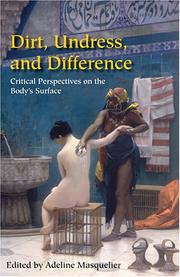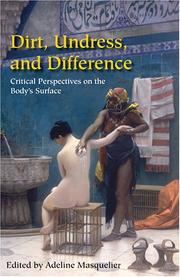| Listing 1 - 10 of 15 | << page >> |
Sort by
|

ISBN: 0822326337 0822326396 0822380552 1282903489 9786612903489 Year: 2001 Publisher: Durham (N.C.) : Duke University Press,
Abstract | Keywords | Export | Availability | Bookmark
 Loading...
Loading...Choose an application
- Reference Manager
- EndNote
- RefWorks (Direct export to RefWorks)
Mawri (African people) --- Bori (Cult) --- Mawri (Peuple d'Afrique) --- Bori (Culte) --- Religion. --- Religion --- Dogondoutchi (Niger) --- #SBIB:39A73 --- Etnografie: Afrika --- Cults
Book
ISBN: 9788874395651 8874395655 Year: 2010 Publisher: Milan : 5 Continents,
Abstract | Keywords | Export | Availability | Bookmark
 Loading...
Loading...Choose an application
- Reference Manager
- EndNote
- RefWorks (Direct export to RefWorks)
Hausa (African people) --- Bori (Cult) --- Spiritual healing --- Portrait photography --- Rites and ceremonies
Book
ISBN: 1282392506 9786612392504 0253003466 9780253003461 9780253353665 0253353661 9780253215130 0253215137 9781282392502 6612392509 Year: 2009 Publisher: Bloomington : Indiana University Press,
Abstract | Keywords | Export | Availability | Bookmark
 Loading...
Loading...Choose an application
- Reference Manager
- EndNote
- RefWorks (Direct export to RefWorks)
In the small town of Dogondoutchi, Niger, Malam Awal, a charismatic Sufi preacher, was recruited by local Muslim leaders to denounce the practices of reformist Muslims. Malam Awal's message has been viewed as a mixed blessing by Muslim women who have seen new definitions of Islam and Muslim practice impact their place and role in society. This study follows the career of Malam Awal and documents the engagement of women in the religious debates that are refashioning their everyday lives. Adeline Masquelier reveals how these women have had to define Islam on their own terms, especially as a practice that governs education, participation in prayer, domestic activities, wedding customs, and who wears the veil and how. Masquelier's richly detailed narrative presents new understandings of what it means to be a Muslim woman in Africa today.
Islam --- Women --- Muslim women --- Mohammedanism --- Muhammadanism --- Muslimism --- Mussulmanism --- Religions --- Muslims --- Human females --- Wimmin --- Woman --- Womon --- Womyn --- Females --- Human beings --- Femininity --- Islamic women --- Women, Muslim --- Social conditions. --- Dogondoutchi (Niger) --- #SBIB:39A10 --- #SBIB:39A11 --- #SBIB:39A73 --- Antropologie: religie, riten, magie, hekserij --- Antropologie : socio-politieke structuren en relaties --- Etnografie: Afrika --- Social conditions --- Muslimahs
Book
ISBN: 9780226624341 022662434X Year: 2019 Publisher: Chicago (Ill.) : University of Chicago press,
Abstract | Keywords | Export | Availability | Bookmark
 Loading...
Loading...Choose an application
- Reference Manager
- EndNote
- RefWorks (Direct export to RefWorks)
"In Niger, urban centers have become ... areas of unemployment filled with young men trying ... to find jobs and fill their time with meaningful occupations ... [The] fada [is] a space where men gather to escape boredom by talking, playing cards, listening to music, and drinking tea ... a place in which new forms of sociability and belonging are forged ... [The author] offers a nuanced depiction of how young men in urban Niger engage in the quest for recognition and reinvent their own masculinity in the absence of conventional avenues to self-realization ..."--Back cover.
Arbeitsloser. --- City dwellers --- City dwellers. --- Hip-Hop. --- Junger Mann. --- Kulturanthropologie. --- Langeweile. --- Masculinity --- Masculinity. --- Mü�iggang. --- Stadtforschung. --- Underemployment --- Unemployment --- Young men --- Zusammenkunft. --- Öffentlicher Raum. --- Psychological aspects --- Psychological aspects. --- Social conditions --- Social conditions. --- Social life and customs --- Social life and customs. --- Niger.
Book
ISBN: 1800738870 Year: 2023 Publisher: New York, NY : Berghahn Books, Incorporated
Abstract | Keywords | Export | Availability | Bookmark
 Loading...
Loading...Choose an application
- Reference Manager
- EndNote
- RefWorks (Direct export to RefWorks)
The “meantime” represents the gap between what is past and the unknown future. When considered as waiting, the meantime is defined as a period of suspension to be endured. By contrast, the contributors of this volume understand it as a space of “the possible” where calculation coexists with uncertainty, promises with disappointment, and imminence with deferral. Attending to the temporalities of emerging rather than settled facts, they put the stress on the temporal tactics, social commitments, material connections, dispositional orientations, and affective circuits that emerge in the meantime even in the most desperate times.
Civilization, Modern --- Social change. --- Time --- Social aspects. --- Anthropology (General), Sociology, Cultural Studies (General). --- Social change --- Social aspects

ISBN: 0253217830 0253346282 Year: 2005 Publisher: Bloomington ; Indianapolis : Indiana University Press,
Abstract | Keywords | Export | Availability | Bookmark
 Loading...
Loading...Choose an application
- Reference Manager
- EndNote
- RefWorks (Direct export to RefWorks)
#SBIB:39A9 --- #SBIB:309H53 --- #SBIB:316.7C124 --- Medische antropologie / gezondheid / handicaps --- Niet-verbale communicatie --- Cultuursociologie: gebruiken, zeden en gewoonten --- Clothing and dress --- Nudity --- Hygiene --- Bathing customs --- Human body --- Vêtements --- Nudité --- Hygiène --- Bains --- Corps humain --- Social aspects --- Congresses --- Aspect social --- Congrès --- Nakedness --- Nude --- Nudism --- Body care --- Cleanliness --- Personal body care --- Personal cleanliness --- Personal hygiene --- Medicine, Preventive --- Health --- Sanitation --- Apparel --- Clothes --- Clothing --- Clothing and dress, Primitive --- Dress --- Dressing (Clothing) --- Garments --- Beauty, Personal --- Manners and customs --- Fashion --- Undressing --- Bathing beaches --- Baths --- Care and hygiene

ISBN: 9786612072543 1282072544 0253111536 9780253111531 0253346282 0253217830 9780253346285 9780253217837 6612072547 9781282072541 Year: 2005 Publisher: Bloomington Indiana University Press
Abstract | Keywords | Export | Availability | Bookmark
 Loading...
Loading...Choose an application
- Reference Manager
- EndNote
- RefWorks (Direct export to RefWorks)
""A magnificent volume! It offers brand new perspectives on body politics and identity or subjectivity formation in the post-colonial world."" Dorothy Ko, Barnard College While there is widespread interest in dress and hygiene as vehicles of cultural, moral, and political value, little scholarly attention has been paid to cross-cultural understandings of dirt and undress, despite their equally important role in the fashioning of identity and difference. The essays in this absorbing and thought
Human body --- Bathing customs --- Hygiene --- Nudity --- Clothing and dress --- Bathing beaches --- Baths --- Body care --- Cleanliness --- Personal body care --- Personal cleanliness --- Personal hygiene --- Medicine, Preventive --- Health --- Sanitation --- Nakedness --- Nude --- Nudism --- Apparel --- Clothes --- Clothing --- Clothing and dress, Primitive --- Dress --- Dressing (Clothing) --- Garments --- Beauty, Personal --- Manners and customs --- Fashion --- Undressing --- Social aspects --- Care and hygiene
Book
ISBN: 0826356990 9780826356994 0826356982 9780826356987 9780826356987 Year: 2016 Publisher: Santa Fe Albuquerque
Abstract | Keywords | Export | Availability | Bookmark
 Loading...
Loading...Choose an application
- Reference Manager
- EndNote
- RefWorks (Direct export to RefWorks)
The contributors to this volume-who draw from a variety of disciplines-show how the study of Muslim youth at this particular historical juncture is relevant to thinking about the anthropology of youth, the anthropology of Islamic and Muslim societies, and the post-9/11 world more generally.
September 11 Terrorist Attacks, 2001 --- Muslim youth. --- Islamic youth --- Youth, Muslim --- Youth --- Influence.
Book
ISBN: 9780226548838 022654883X 9780226548975 022654897X 9780226549026 022654902X Year: 2018 Publisher: Chicago The University of Chicago Press
Abstract | Keywords | Export | Availability | Bookmark
 Loading...
Loading...Choose an application
- Reference Manager
- EndNote
- RefWorks (Direct export to RefWorks)
For far too long, the Western world viewed Africa as unmappable terrain—a repository for outsiders’ wildest imaginings. This problematic notion has had lingering effects not only on popular impressions of the region but also on the development of the academic study of Africa. Critical Terms for the Study of Africa considers the legacies that have shaped our understanding of the continent and its place within the conceptual grammar of contemporary world affairs. Written by a distinguished group of scholars, the essays compiled in this volume take stock of African studies today and look toward a future beyond its fraught intellectual and political past. Each essay discusses one of our most critical terms for talking about Africa, exploring the trajectory of its development while pushing its boundaries. Editors Gaurav Desai and Adeline Masquelier balance the choice of twenty-five terms between the expected and the unexpected, calling for nothing short of a new mapping of the scholarly field. The result is an essential reference that will challenge assumptions, stimulate lively debate, and make the past, present, and future of African Studies accessible to students and teachers alike. (provided by publisher)
Book

ISBN: 9781789202144 Year: 2019 Publisher: New York Oxford
Abstract | Keywords | Export | Availability | Bookmark
 Loading...
Loading...Choose an application
- Reference Manager
- EndNote
- RefWorks (Direct export to RefWorks)
| Listing 1 - 10 of 15 | << page >> |
Sort by
|

 Search
Search Feedback
Feedback About UniCat
About UniCat  Help
Help News
News